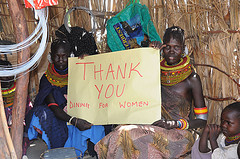
With sustained funding of $45,000 from Dining for Women, BOMA will launch 36 Rural Entrepreneur Access Project (REAP) micro-enterprises per year, over three years, for a total of 108 new businesses. Each new business provides a diversified income for three women, and our data shows that each woman cares for an average of five children. The total three-year impact of the Dining for Women grant: 324 women entrepreneurs who will use the income to support an estimated 1,620 children. Many of these micro-enterprises will be launched near Archer’s Post in the Samburu District of Northern Kenya, a new region of expansion for BOMA.
BOMA Sustained Program Fact Sheet 2013
BOMA Impact Summary – Jan. 2014
Since 2009, Dining for Women and BOMA have worked together to solve one of Africa’s toughest problems: how to establish sustainable incomes and build resilience for ultra-poor women in the arid lands. Our success has proven that the most urgent long-term need in rural Africa—and the most promising long-term solution—is to give women the tools of economic self-empowerment, so they can start small businesses, earn a sustainable income, create a resilient grassroots economy and adapt to a changing climate. Together, we are equipping the poorest, most unempowered women of Northern Kenya with the skills, income and savings they need to graduate from extreme poverty and provide for themselves and their children—forever.
2009 Featured Grant Info
Project Title: The BOMA Project
Location: Kenya
Grantee Website: bomaproject.org
Areas of Impact: Education & Literacy, Economic Sustainability
Mission of The BOMA Project: Featured (2009), Sustained (2013-2015)
The BOMA Project works to improve the lives of the marginalized residents of northern Kenya through economic empowerment, education, advocacy and the training of a new generation of entrepreneurial, ethical leaders. BOMA does this by implementing innovative micro-finance and skills-training programs in order to establish enduring small businesses; by providing merit-based se condary, vocational and university scholarships for ambitious students willing to give back to their communities; by creating awareness of the plight of pastoral nomadic communities; and by mobilizing human, financial and technical resources so that residents may lead healthy, productive lives.
Summary
The BOMA Project (formerly the BOMA Fund) works to alleviate poverty in Laisamis district and Karare region of northern Kenya through capacity building and education, improving an individual’s ability to earn their own income. Note: 90% of BOMA Project program recipients are women. Dining for Women (DFW) will support Boma's Rural Entrepreneur Access Project (REAP), which works with women living in the village of Loiyangalani. REAP is a grant-based training and mentoring program that helps people, mostly women, start small businesses.
A collective gift of $15,000 will launch 60 businesses, impacting the lives of 300 women and their families.
Kathleen Colson, the founder and executive director of BOMA, has been organizing and leading safaris in Kenya for over 25 years, as well as working with various conservation and humanitarian causes throughout Africa. In 2005, she created the BOMA Fund, recently renamed to the BOMA Project, which is co-led by Ahmed Omar, the BOMA Project’s Operations Director in Kenya.
Dining for Women's December donations will fund:
THE RURAL ENTREPRENEUR ACCESS PROJECT (REAP), an innovative micro-finance program developed by The BOMA Project (Formerly the BOMA Fund) that is completely led by local residents in the nomadic and settled villages of northern Kenya. DFW will fund the economic empowerment of 125 women in and around the villages of Karare, Ngurunit and South Horr in Laisamis district.
IMPLEMENTATION OF MICRO-SAVINGS PROGRAM FOR LOIYANGALANI BUSINESSES, a micro-savings training program to be delivered to the 60 businesses previously funded by DFW in 2009 from Loiyangalani: 4 training sessions of 15 groups each in 2011.
Why We Love This
The BOMA Project has made great strides in aiding the hungry and sees even greater promise in expanding their program, with help from organizations like DFW. A three year Impact Assessment study from BOMA's REAP program reported a 53% increase in food consumption with meals consumed per day increasing from 1.7 meals per day to 2.6 meals per day and a 48% increase in the number of children attending school. In Laisamis District, where currently just 24% of all children attend primary school, BOMA expects an even greater impact. There are no banks for savings deposits, so people commonly convert cash savings into livestock. Livestock remain an important source of nutrition as well as a source of cultural and economic vitality. Already, thanks to BOMA, the value of animals owned increased 161%.
Location Map
